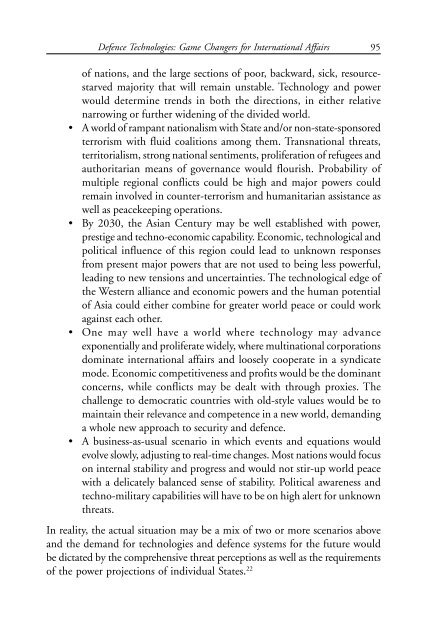ROLE OF TECHNOLOGY INTERNATIONAL AFFAIRS
book_role-of-technology-in-international-affairs_a-mallik_1
book_role-of-technology-in-international-affairs_a-mallik_1
You also want an ePaper? Increase the reach of your titles
YUMPU automatically turns print PDFs into web optimized ePapers that Google loves.
Defence Technologies: Game Changers for International Affairs<br />
95<br />
of nations, and the large sections of poor, backward, sick, resourcestarved<br />
majority that will remain unstable. Technology and power<br />
would determine trends in both the directions, in either relative<br />
narrowing or further widening of the divided world.<br />
• A world of rampant nationalism with State and/or non-state-sponsored<br />
terrorism with fluid coalitions among them. Transnational threats,<br />
territorialism, strong national sentiments, proliferation of refugees and<br />
authoritarian means of governance would flourish. Probability of<br />
multiple regional conflicts could be high and major powers could<br />
remain involved in counter-terrorism and humanitarian assistance as<br />
well as peacekeeping operations.<br />
• By 2030, the Asian Century may be well established with power,<br />
prestige and techno-economic capability. Economic, technological and<br />
political influence of this region could lead to unknown responses<br />
from present major powers that are not used to being less powerful,<br />
leading to new tensions and uncertainties. The technological edge of<br />
the Western alliance and economic powers and the human potential<br />
of Asia could either combine for greater world peace or could work<br />
against each other.<br />
• One may well have a world where technology may advance<br />
exponentially and proliferate widely, where multinational corporations<br />
dominate international affairs and loosely cooperate in a syndicate<br />
mode. Economic competitiveness and profits would be the dominant<br />
concerns, while conflicts may be dealt with through proxies. The<br />
challenge to democratic countries with old-style values would be to<br />
maintain their relevance and competence in a new world, demanding<br />
a whole new approach to security and defence.<br />
• A business-as-usual scenario in which events and equations would<br />
evolve slowly, adjusting to real-time changes. Most nations would focus<br />
on internal stability and progress and would not stir-up world peace<br />
with a delicately balanced sense of stability. Political awareness and<br />
techno-military capabilities will have to be on high alert for unknown<br />
threats.<br />
In reality, the actual situation may be a mix of two or more scenarios above<br />
and the demand for technologies and defence systems for the future would<br />
be dictated by the comprehensive threat perceptions as well as the requirements<br />
of the power projections of individual States. 22


